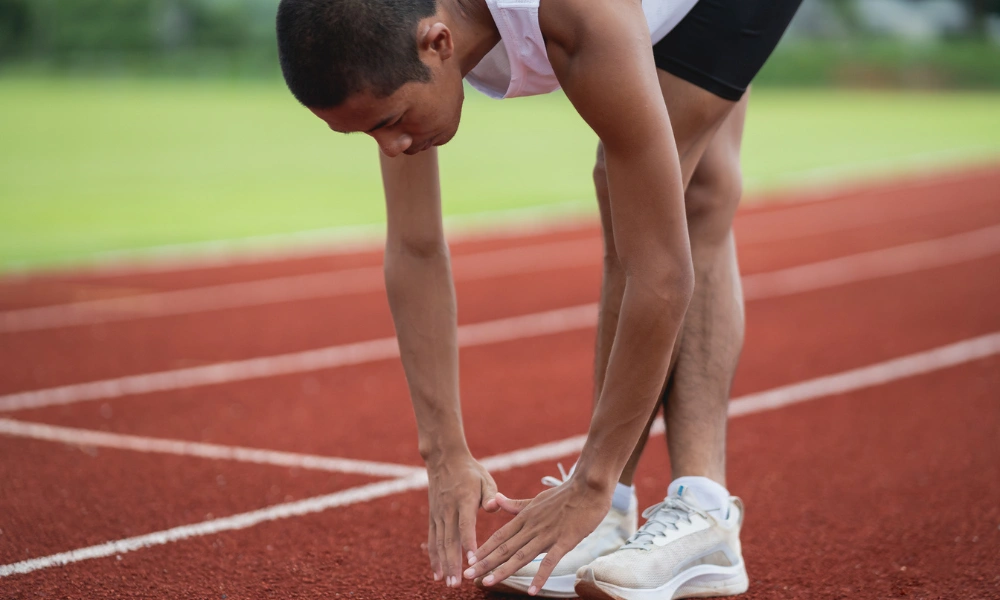The better you breathe, the more oxygen you get and the more waste you can get rid of, like carbon dioxide.
Most of the time, we don’t think about how we breathe because it happens independently. However, breathing can make a significant difference when running.
If you don’t breathe well, your heart and lungs must work harder, and you get tired quicker. By mastering how to control breathing while running, you can run more smoothly and efficiently, thereby delaying the onset of tiredness and enhancing your performance.
How to Control Breathing While Running

My Experience with Breathing and Running
I’ve personally struggled with poor breathing technique, especially during the early stages of my training. I used to find myself out of breath quickly, especially on longer runs. Over time, I began experimenting with nasal breathing, posture adjustments, and proper warm-ups, and the difference was like night and day.
Now, I can comfortably run longer distances without feeling winded, and I’ve coached beginner runners through the same transformation.
Pre-run Breathing Warm-up
Take a few deep breaths. Here’s how to do it:
- Put one hand on your chest and the other just below your ribcage.
- Breathe slowly through your nose. As you do this, your stomach should push out against your lower hand while your upper hand (on your chest) stays as still as possible.
- As you breathe out through lips that are almost closed (like you’re blowing through a straw), try to pull your stomach muscles in. This pushes the air out.
This helps stretch out the muscles and tissues in your lungs, preparing them for the workout.
Nasal Breathing
Breathing through the nose cleans, warms, and adds moisture to the air we breathe before it reaches our sensitive lungs, protecting us from potential damage caused by air debris or cold, dry air.
A study published in the International Journal of Kinesiology and Sports Science found that runners who practiced nasal breathing experienced improved physiological economy. Specifically, nasal breathing reduced total ventilation at a given workload by about 23%, leading to a 2–3% decrease in overall energy consumption.
This suggests that nasal breathing can make running more efficient by delivering oxygen more effectively while using less energy.
Stimulate the parasympathetic nervous system, promoting relaxation and energy conservation.
Mouth breathing makes us breathe too much; a significant portion of the air we inhale isn’t effectively used for oxygen exchange; instead, it stays in our mouth, throat, and bronchi without reaching our lungs.
At first, the nose breathing might feel weird, so starting slow is okay. Try breathing through your nose during light exercises; as you get used to it, you can do it during more intense activities. This type of breathing is also called diaphragmatic breathing.
Posture
Paying attention to specific aspects of your form can make breathing and filling your lungs easier.
Focus on keeping your shoulders relaxed and pulled down and back, broaden your chest, and let your arms swing like pendulums from front to back. Efficient breathing is supported by the upper back muscles, lats, and core, so engage these areas.
According to experts, tight chest and pectoral muscles can contribute to shallow breathing because they limit the space for proper inhalation. To counter this, mixing posture-strengthening exercises into your strength routine is essential.
How to Stop Getting Out of Breath While Running?
- If you feel out of breath while running, your heart rate has reached a high level.
- Running at a high pace can lead to wear and tear of the heart muscle, so it’s best to avoid it.
- For beginners, we recommend taking a step or slowing down to a jog whenever you feel breathless or suffocated.
- Beginning runners often experiment with breathing techniques, such as breathing only through the nose or specific count patterns (e.g., inhale for 2 counts, exhale for 3). These experiments can cause you to lose your breath.
- Instead, breathe naturally. Once your breathing is restored, you can resume jogging.
- When your heart rate rises and you feel short of breath, slow down. Repeatedly slowing down when you feel out of breath will help your body adapt to the stress, and your pulse will stabilize over time.
Why Do I Struggle to Breathe?

If you find breathing hard when you run, do not ignore it if it happens often and in different situations. This is even more important if you’ve been training for a while and are in good shape.
For instance, if you haven’t found out yet that you have asthma or if your asthma isn’t being treated right, getting the proper treatment or changing your medicine could fix the problem.
There are mainly four main reasons you might get out of breath when you run:
1. Weak Fitness
You are getting out of breath when you run because you’re not in good shape. Your body has yet to get used to running.
Regular aerobic exercises make your heart and lungs work better, and your breathing muscles will strengthen, and you’ll be able to breathe more deeply and quickly without struggling as much.
2. Running Too Fast
Another reason you might run out of breath is because you’re running too fast for how fit you are right now—running works out your whole body. Your lungs must work harder and faster to get oxygen and push out carbon dioxide.
When you run faster, you use more energy every minute, and your muscles and heart need oxygen more quickly as your workout’s intensity increases.
If you push yourself too hard and go past your anaerobic threshold, your body can’t make energy quickly enough using oxygen.
So, it starts using anaerobic glycolysis, which doesn’t need oxygen but isn’t as good at making energy. This process also creates by-products that make you tired quickly and breathe even more heavily.
Running without enough oxygen leads to the buildup of lactate and hydrogen ions in your muscles, making them acidic. This acidity can cause a burning feeling in your legs, making them very tired.
Your body tries to balance out this acidity, which makes more carbon dioxide in your blood. Too much carbon dioxide is harmful, but luckily, we can breathe out the excess.
So, when you rely more on this less efficient energy process, you’ll find yourself breathing harder and faster to eliminate the extra carbon dioxide, making you feel out of breath.
3. You Have Asthma
If you still find it hard to breathe, you might have asthma that hasn’t been seen or isn’t being treated properly.
Some people have asthma that bothers them in their everyday lives, but it’s also common to have asthma that only flares up when you run. If asthma isn’t treated or isn’t managed well, it can lead to an asthma attack.
This is a severe and sudden worsening of asthma symptoms that makes it hard to breathe, even if you’re not doing anything. Rescue inhalers are made to quickly open your airways and reduce swelling so you can breathe easier.
Doing warm-up exercises like walking lunges or skipping can help prepare your muscles and joints, and prepare your heart and lungs.
Talking to your doctor about the best way to manage your asthma and possibly taking medicine before you exercise can help make breathing more effortless when you work out and lessen asthma symptoms.
It’s also good to know what triggers your asthma besides exercise. For example, does running in cold or dehydrated air make it worse? Does pollen in the air during allergy season affect you?
Keeping track of what triggers your exercise-induced asthma can help you figure out the best time to run or how to change your workout to avoid breathing problems. If running in cold, dry air makes breathing hard for you, you should wear a buff or a facemask to warm and moisten the air.
4. Other Medical Reasons
There could be other health reasons you feel out of breath during exercise.
For instance, if you have low iron or anemia, your body might struggle to carry enough oxygen to your working muscles. This can make you breathe faster, but you might need more oxygen.
If you’re new to running and breathing hard, being patient is important. Take breaks when necessary, and be bold and slow down. Your fitness will improve, but it’s essential to go at a pace that lets your body get enough oxygen.




